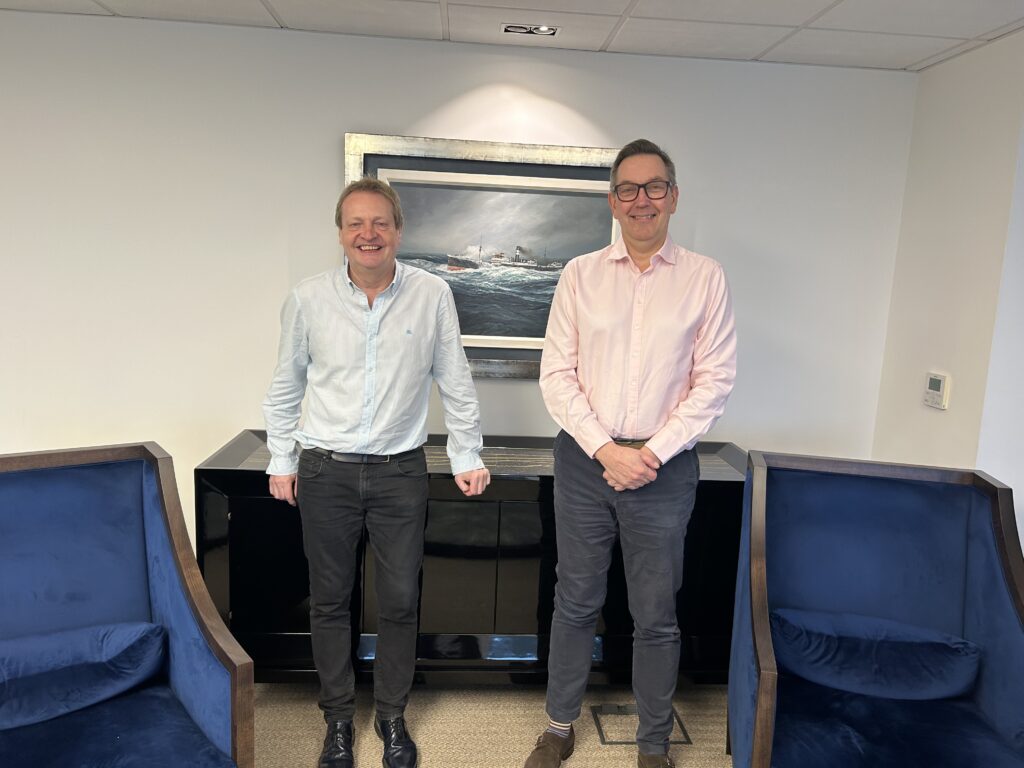
In the heart of London’s bustling maritime sector, Arrow stands out as a beacon of excellence. Founded in 1990, this preeminent shipbroking firm has carved in dry cargo and tanker chartering, a notable presence in the second-hand and newbuilding markets. As the company eyes expansion into the energy and derivatives trading sectors, including emissions trading schemes like the EU ETS, we sat down with Patrick Morrison, Director and Head of Newbuilding, and John Varley, Director of Sale and Purchase, to delve into the evolving role of brokers and Arrow’s strategic direction. (Interviewer, Hirofumi Yamamoto)
Hirofumi Yamamoto: Let’s begin with a bit of history. Can you share with us Arrow’s journey since its inception?
Patrick Morrison: Arrow has indeed come a long way since 1990. We’ve grown to become one of the world’s largest shipbrokers, offering an array of brokerage and research services across 16 countries. Our team specializes in the sale and purchase of merchant vessels, chartering, and providing insightful research and valuations for pre-owned vessels. The digital age has significantly transformed how we operate, amplifying the importance of brokers in facilitating transactions and ensuring the flow of accurate information in an era inundated with data.
John Varley: Absolutely, Patrick. The broker’s role as a mediator, or a “buffer,” has never been more critical. In today’s information-rich environment, our responsibility extends beyond merely connecting parties. We’re here to sift through the noise, offering clarity and trust, which are paramount in our line of work.
Hirofumi Yamamoto: Speaking of challenges, how does Arrow navigate the complexities of assessing the shipping market?
Patrick Morrison: It’s no small feat. The shipping market is notoriously difficult to predict, even for seasoned professionals. Take the Panama Canal and its influence on the bulk cargo and LNG carrier markets as an example. These dynamics are complex and often counterintuitive, underscoring the need for deep market insight and expertise.
Hirofumi Yamamoto: With newbuilding prices soaring, what’s your take on the current market trends?
John Varley: The surge in newbuilding prices is multifaceted. Rising steel prices and labor shortages, particularly in key shipbuilding nations like Japan and South Korea, play significant roles. Moreover, advancements in ship technology and the push for more efficient, dual-fuel engines in compliance with environmental regulations are driving costs upward. It’s a reflection of both the challenges and the progress in our industry.
Hirofumi Yamamoto: The Japanese shipping sector often carries a reputation for being conservative. How does Arrow view this compared to other global shipping communities?
Patrick Morrison: Our extensive experience with the Japanese market has shown us that it’s not particularly more conservative than others. Every market has its dynamics, and within each, shipowners have their unique strategies and preferences. The Japanese market, with its high-technology shipyards and emphasis on quality and efficiency, remains pivotal to our operations and to the global newbuilding sector.
Hirofumi Yamamoto: How important is the Japanese market to Arrow’s future plans?
John Varley: It’s absolutely crucial. Our clientele has a strong preference for Japanese shipyards due to their technological prowess and the superior quality of their vessels. Japan’s role in the newbuilding market cannot be overstated, and we continue to value our partnerships and operations there highly.
Hirofumi Yamamoto: Arrow’s ambition extends to the energy sector and even plans to move its headquarters closer to the heart of London. Can you tell us more about this strategic shift?
John Varley: Indeed, our vision is to diversify and enrich our portfolio by venturing into new markets, particularly the energy sector. The cornerstone of our strategy is the acquisition of talent. We’ve been fortunate enough to bring on board individuals with the expertise and drive to spearhead our entry into this dynamic field. The derivatives market, with its myriad opportunities ranging from renewable energy and biofuels to carbon trading, with the EU ETS being a prime focus, represents a significant area of growth for us.
Patrick Morrison: That’s right, John. Our move to a new office in central London, along with 75 of our staff, signifies more than just a physical relocation. It’s a strategic positioning that aligns with our expansion goals. By situating ourselves at the nexus of London’s financial and energy markets, we aim to leverage the synergies that this vibrant location offers, facilitating our foray into the energy and derivatives trading spaces. This move is a testament to our commitment to growth, innovation, and staying at the forefront of industry trends.